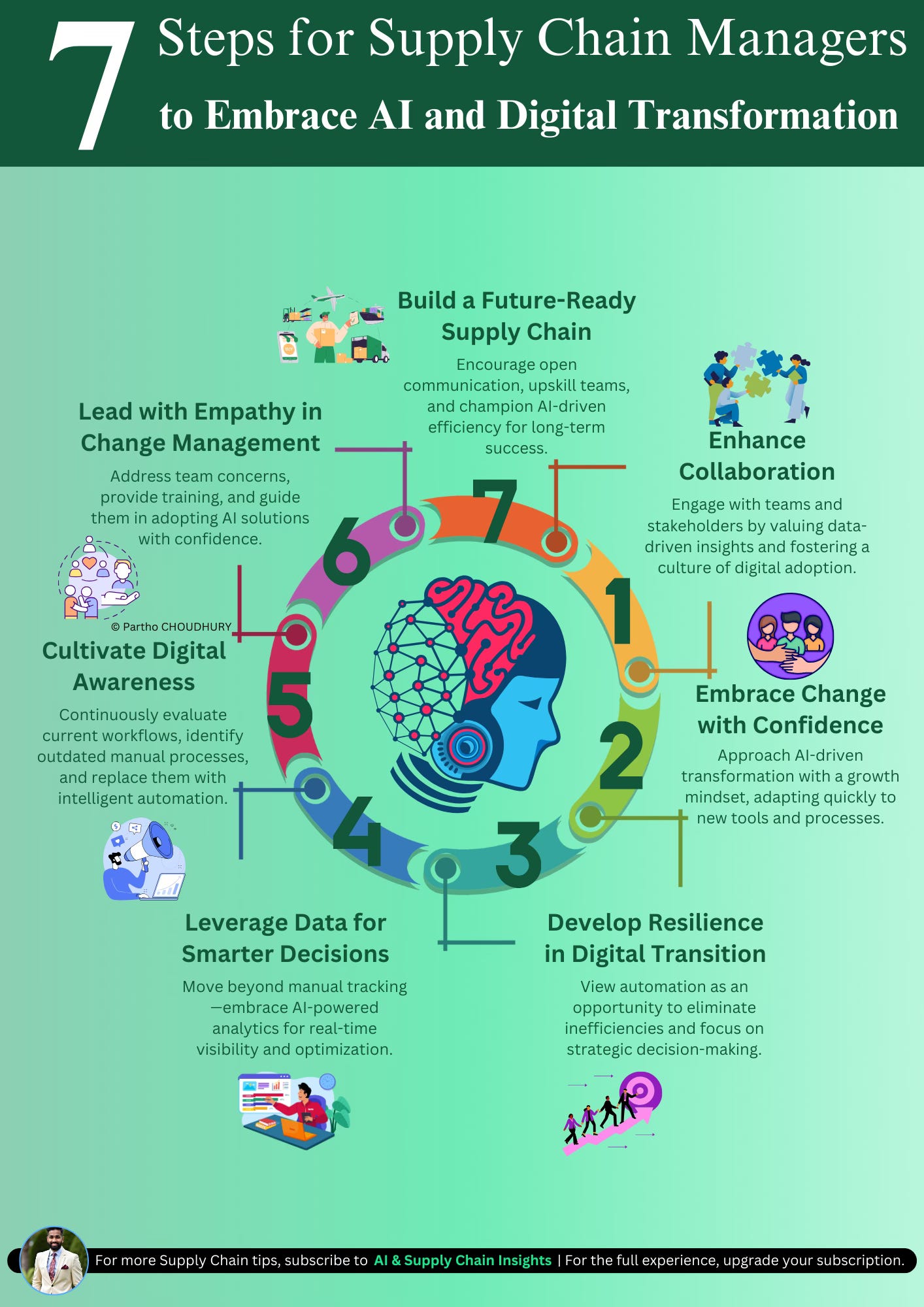Are Supply Chain Managers Ready to Ditch Manual Work for AI?
The shift to AI-powered supply chains isn’t just a trend—it’s a massive change that will redefine the industry. Is your supply chain ready to lead the transformation?
Brace yourself.
This isn’t just another tech upgrade.
It’s a shift so massive that those who ignore it may never catch up.
It all starts with one question:
How do the world’s top supply chain leaders stay ahead of disruptions?
They don’t rely on manual tracking.
They use 7 powerful digital transformation principles to stay ahead of the curve. ↓ ↓
1️⃣ Enhance Collaboration
The best supply chain managers know one thing for sure: they’re not lone warriors.
They understand that in order to drive success, they need to break silos and foster collaboration across all departments.
• They leverage AI-powered insights to share real-time data and remove the barriers between teams.
• They create a culture where data, not opinions, drive decisions—enabling smarter and faster collaboration across the entire supply chain.
Those who don’t?
They waste time fixing problems that AI could easily prevent. By embracing AI, they eliminate communication bottlenecks and drive faster decision-making.
2️⃣ Embrace Change with Confidence
Let’s set the record straight: AI isn’t replacing supply chain managers.
But those who resist AI may end up replaced by those who embrace it.
• The best leaders don’t fear automation; they see it as an upgrade, not a threat.
• They adapt to new tools before disruptions force them to.
The slow adopters?
They’ll spend years playing catch-up—watching competitors zoom ahead because they stayed stuck in the past.
3️⃣ Develop Resilience in Digital Transition
AI isn’t just about optimizing processes today—it’s about future-proofing the entire supply chain.
• What if predictive analytics could eliminate stockouts before they even happen?
• What if automation could handle repetitive tasks, allowing you to focus more on strategic decision-making?
The best supply chain managers use AI not just to drive efficiency, but to build resilience—so they can withstand disruptions, no matter how unpredictable.
4️⃣ Leverage Data for Smarter Decisions
Gone are the days of manual reports and spreadsheets.
In today’s fast-paced world, real-time AI-powered dashboards are the gold standard.
• The best supply chain leaders don’t just react to disruptions—they predict and prevent them by using data-driven insights.
• They replace manual processes with AI, streamlining decision-making and leaving guesswork behind.
Those who stick to the old ways?
They’ll find themselves at the back of the pack, unable to keep up with the speed and efficiency of AI-enabled processes.
5️⃣ Lead with Empathy in Change Management
Adopting AI in supply chain management isn’t just about technology—it’s about people.
• The best leaders understand the emotional challenges of AI adoption. They focus on training, communication, and ensuring their teams feel empowered by AI rather than intimidated by it.
• They provide clarity, guidance, and a solid vision for the future—ensuring that AI is seen as a tool for empowerment, not confusion.
When change is led with empathy, it’s much easier for teams to adapt and thrive.
6️⃣ Cultivate Digital Awareness
The worst words in any supply chain company?
“We’ve always done it this way.”
The most successful leaders understand that staying ahead of the competition means constantly reevaluating processes and challenging the status quo.
• They replace outdated manual workflows with intelligent automation to eliminate inefficiencies.
• They cultivate a culture of digital awareness, ensuring that their teams are always looking for ways to improve through technology.
Those who resist change?
They risk becoming obsolete in a fast-evolving industry.
7️⃣ Build a Future-Ready Supply Chain
Here’s the big question: It’s not if AI will dominate supply chains. It’s who will lead the transformation?
• The supply chain leaders who invest in AI-driven efficiencies will thrive. They’ll be able to predict disruptions, optimize processes, and future-proof their organizations.
• The ones who cling to old systems and manual work? They’ll struggle to keep up with the pace of change.
The future of supply chain management is digital, and it’s happening right now.
Are You Ready to Lead the Change? 🚀
The shift from manual work to AI-powered supply chain management isn’t a trend—it’s a revolution.
Those who embrace this shift will thrive in the future. Those who don’t? They’ll risk becoming irrelevant in a digital world.
So, are you ready to lead the change?





